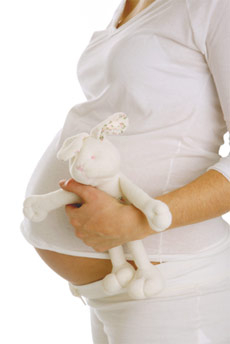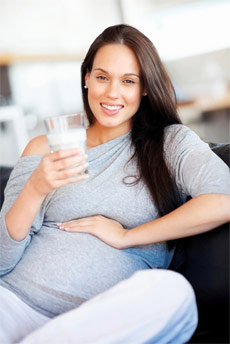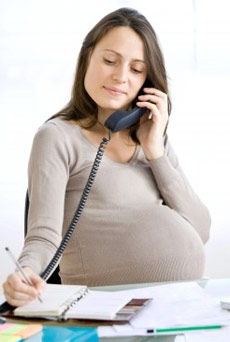|
|
|
 , ,
Font size |
Pregnancy Associated Osteoporosis
 Osteoporosis associated
with pregnancy is
a rare condition when bones break/fracture suddenly or severe pain occurs during
or soon after pregnancy in otherwise apparently healthy women. These fractures
can occur in the spine or occasionally the hip and result in pain and
disability. Coping with fractures alongside the demands of a new baby can be
particularly difficult for those affected. Osteoporosis associated
with pregnancy is
a rare condition when bones break/fracture suddenly or severe pain occurs during
or soon after pregnancy in otherwise apparently healthy women. These fractures
can occur in the spine or occasionally the hip and result in pain and
disability. Coping with fractures alongside the demands of a new baby can be
particularly difficult for those affected.
Pregnancy-associated osteoporosis tends to be identified in the postpartum
period (56%) or the third trimester (41%). Also, symptoms occurred
most often in the first pregnancy (17 patients) at a mean age of 27 years (range
21-36); the most frequent was back pain in late pregnancy or post partum (n =
18); less common was hip (n = 5) or ankle (n = 1) pain.
Osteoporosis is defined by the World Health Organization (WHO) as a bone
mineral density of 2.5 standard deviations or more below the mean peak bone
mass (average of young, healthy adults) as measured by dual-energy X-ray
absorptiometry; the term "established osteoporosis" includes the presence of
a fragility fracture.
|
Possible Causes:
Pregnancy-associated osteoporosis is believed to occur because of the stress on
maternal calcium stores and an increase in urinary calcium excretion. Factors
that may cause this condition, such as genetic factors or steroid use, are being
studied. Even though there is stress on
a pregnant woman�s calcium supply and calcium excretion is increased by frequent
urination, other changes during pregnancy, like increases in estrogen and weight
gain,
may actually help bone
density.
Treatment & Management
Patients identified as at risk for osteoporosis should undergo preventive measures, including,
-
 Adequate calcium intake:
If you do not consume enough calcium to
sustain the needs of your developing baby, your body will take calcium from
your bones,
decreasing your bone mass
and putting you at risk for osteoporosis. Osteoporosis initiates dramatic
thinning of the bone, resulting in weak, brittle bones that can easily be
broken. The U.S. Recommended Daily Allowance (USRDA) for calcium is 1200
milligrams (mg) per day for pregnant and lactating (breastfeeding) women
over age 24. The USRDA for women under age 24 is 1200 to 1500 mg. of calcium
per day. Adequate calcium intake:
If you do not consume enough calcium to
sustain the needs of your developing baby, your body will take calcium from
your bones,
decreasing your bone mass
and putting you at risk for osteoporosis. Osteoporosis initiates dramatic
thinning of the bone, resulting in weak, brittle bones that can easily be
broken. The U.S. Recommended Daily Allowance (USRDA) for calcium is 1200
milligrams (mg) per day for pregnant and lactating (breastfeeding) women
over age 24. The USRDA for women under age 24 is 1200 to 1500 mg. of calcium
per day.
-
Vitamin D intake: Vitamin
D will
help your body use calcium. Adequate amounts of Vitamin D can be obtained
through exposure to the sun and in eggs, fish, and fortified milk, and
-
Exercise:
Do exercises that strengthen your back extensors. Strong back extensors
help reduce the incidence of fracture. It would be best to get professional
instruction. Avoid spinal flexion exercises such as abdominal crunches,
sit-ups, knee-to-chest, toe-touches etc. These have been shown to
dramatically increase risk of fracture. Before beginning an exercise
program,
we recommend discussing guidelines for safety with your healthcare provider.
-
 Practical Living:
Be extremely careful how you lift things. It is very important to keep
objects as close to your body as possible when lifting them and of course,
try to keep your back straight. Lifting things out away from your body
increases the pressure on your spine exponentially. Practical Living:
Be extremely careful how you lift things. It is very important to keep
objects as close to your body as possible when lifting them and of course,
try to keep your back straight. Lifting things out away from your body
increases the pressure on your spine exponentially.
-
Avoid tobacco use:
Cigarettes contain many chemicals that cross the placenta into the
developing baby�s blood. Smoking and
exposure to second-hand smoke during pregnancy can harm your developing
baby's growth, and can cause miscarriage, stillbirth, preterm birth, low
birth weight, and other problems for you and your baby.
-
Identify and treat alcoholism:
Drinking alcohol
during pregnancy can
result in lifelong disabilities for your child called Fetal Alcohol Spectrum
Disorder (FASD). Children with FASD have problems with hearing, speech and
vision, learning problems, poor memory, and poor coordination. They also
have difficulty handling emotions. Also, alcohol provides calories with
little nutrition. It is never too late to quit or cut down.
Pregnancy associated osteoporosis is temporary and can be corrected with due
care.
Dated 16 May 2013
Related Links
|
|
|
|
|









